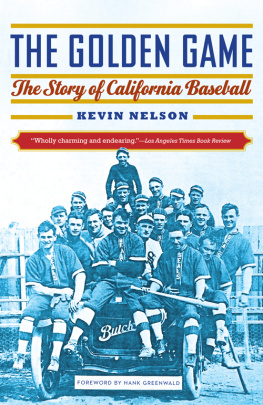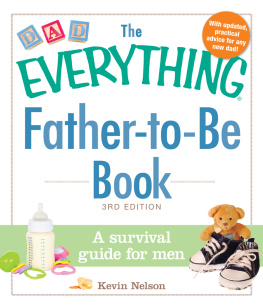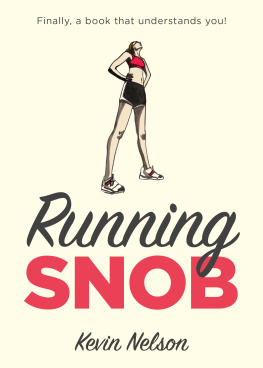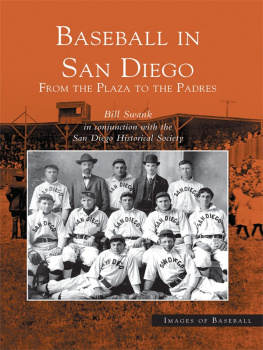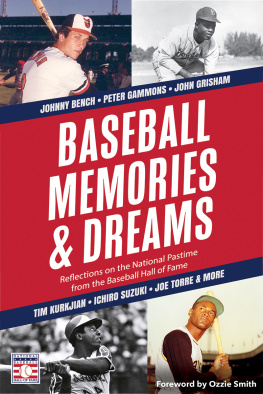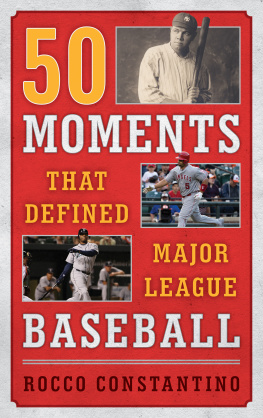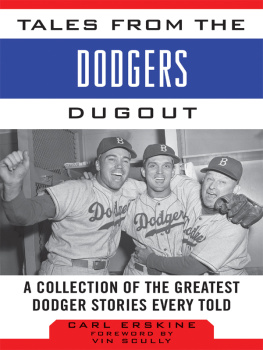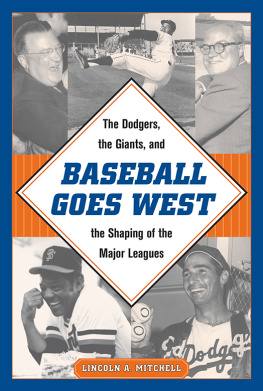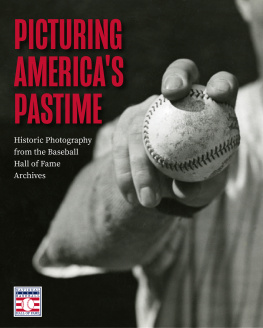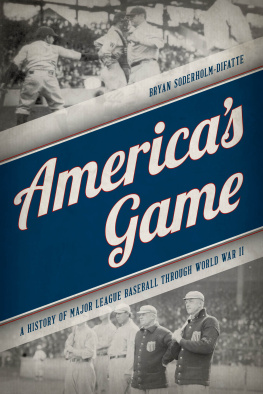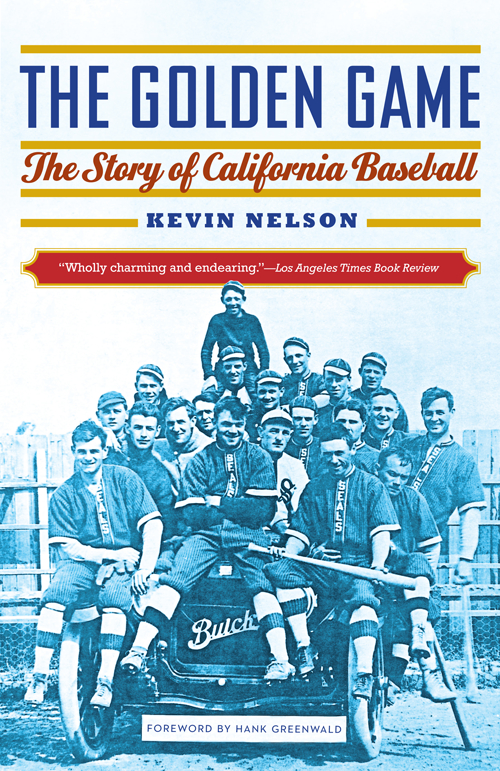
[Nelsons] wholly charming and endearing book allows us to see baseball as a kind of benchmark for the birth and growth of California over the last century and a half.... Nelson shows us that baseball was always much more than a form of recreation or entertainmentit was a means of self-definition.
Jonathan Kirsch, Los Angeles Times Book Review
[An] excellent history.... You dont have to be a Californian to enjoy these important chapters in the games history.
Ron Fimrite, Sports Illustrated
[This is] the rare baseball book that transcends its regional emphasis to earn a place on the shelf of anyone who loves the game. It reads like a core sample of a polar ice cap, with layer upon informative layer the deeper you go.
David Kipen, San Francisco Chronicle
Nelson has a knack for research and an ear for good anecdotes as he reviews the impact California baseball has had not only on the game in this country but as an export to Japan and Mexico as well.
Publishers Weekly
A superb blending of United States and California history, plus baseball. Well-illustrated and written in a compelling manner that few books can rightly claim, this is a rare literary sports treasure that can be recommended with great enthusiasm.
Oakland Tribune
Ive read some terrific sports books in recent years... but I found none more interesting than Kevin Nelsons current page-turner, The Golden Game: The Story of California Baseball. If youre a baseball aficionado or even if you arent, this is a wonderfully researched narrative about the genesis of the sport in the state.
Doug Krikorian, Long Beach Press-Telegram
This book is a must read for all baseball fans, young and old. Every chapter is a story in its own. It should be a part of everyones library.
California Historian

The Golden Game
The Story of California Baseball
Kevin Nelson
Foreword by Hank Greenwald
University of Nebraska Press | Lincoln and London
2004 by Kevin Nelson. Foreword 2004 by Hank Greenwald. All rights reserved.
Cover image is from the interior.
Originally published by the California Historical Society Press and Heyday Books. First Nebraska paperback printing: 2015.
Library of Congress Cataloging-in-Publication Data
Nelson, Kevin, 1953
The golden game: the story of California baseball / Kevin Nelson; foreword by Hank Greenwald.
pages cm
Originally published by the California Historical Society Press and Heyday BooksT.p. verso.
Includes bibliographical references and index.
ISBN 978-0-8032-8395-4 (paper: alk. paper)
ISBN 978-0-8032-8423-4 (epub)
ISBN 978-0-8032-8424-1 (mobi)
ISBN 978-0-8032-8425-8 (pdf) 1. BaseballCaliforniaHistory. I. Title.
GV 863. C 2 N 43 2015
796.35709794dc23
2014049383
The publisher does not have any control over and does not assume any responsibility for author or third-party websites or their content.
For Jules Tygiel, scholar, lover of baseball, and a friend of this book; and Hank and Gabe Nelson, two young Californians on the rise
Contents
Many thanks to those people and organizations who graciously allowed us to include their photographs in this new edition.
Hank Greenwald
Like the precious metal that drew thousands to the Golden State over 150 years ago, there are nuggets galore to be found in the mining of Californias rich baseball heritage. Fortunately, Kevin Nelson has successfully dug them up for us in The Golden Game: The Story of California Baseball.
The westward migration did not stop with the gold rush; the flow of those seeking a better life, and certainly a better climate, continues daily, enriching both California and those she welcomes. And, as was the case in the nineteenth century, people continue to bring their baseball interest with them in the twenty-first. But there is no residency requirement mandating that those who relocate will adopt local teams. Therefore, it is a common sight at ballparks in San Diego, Anaheim, Los Angeles, San Francisco, and Oakland to witness fans cheering for teams like the Cubs, Yankees, Red Sox, and many others. Affection for the old hometown team is a transportable commodity, as is the love of the game itself. There are no geographic restrictions.
Much has been written about the imprint of baseball upon American life. Unlike sports whose presence seems to die at the end of their season, baseball knows no such boundaries. It remains with us through the long winter months, manifesting itself in the rehashing of playoffs and World Series outcomes. With the ushering in of a new year, the anticipation grows daily as we await the news heralding the rebirth of a new season: Spring training opens tomorrow. Only the true baseball fan knows the exhilaration that accompanies those words.
The novelist James T. Farrell once wrote, Baseball is Americas game. Since around the middle of the nineteenth century weve been playing it and watching it. Kids, poets, presidents, thieves, senators, generals, shop clerks, steelworkers, movie stars, teamsters, farmers, writers all have been drawn to the game and have been moved by it. Baseball is our language, our history, our blood. Without it, the world would be far different for many of us.
As Nelson points out, even the vast Pacific Ocean was not capable of confining baseballs popularity to the continental United States. When New Yorker Alexander Cartwright, an early visitor to California, found that his dream of finding gold had faded, he continued west to Hawaii, where he began spreading the baseball gospel. Evidence of this was clear to me in 1965 when I was broadcasting the games of the Pacific Coast Leagues Hawaii Islanders. One of the first things I noticed at the old Honolulu Stadium on King Street was a plaque commemorating Cartwrights days in the islands and recognizing him as modern baseballs creator. (In fact, if the stadiums condition was any indication, it must have been the venue for Cartwrights first game there.)
It seems reasonable that a state large enough in size, population, and economy to be a nation of its own might export baseball along with many of its more conventional products. In reading The Golden Game, youll discover how baseball in California helped to sow the seeds of fanatical interest so evident in the Land of the Rising Sun. In this regard the role of San Franciscos own Lefty ODoul is fully explored. It was ODoul who, both before and after World War II, helped popularize the game in Japan by organizing tours of Major League ballplayers. Perhaps only he could have arranged for the likes of Babe Ruth, Lou Gehrig, and many others to make the long journey. Lefty wasnt simply involved in running a tour but in fostering a friendship with the Japanese people. He worked with young players, imparting wisdom and nurturing skills in a way that only one of his ability and personality could accomplish. ODoul became known as the Father of Baseball in Japan by suggesting a means by which players could work for industry, which in turn formed the basis for professional baseball in that country.
It would be wrong to suggest that the export of baseball to Japan was a one-way street. Second-generation Japanese in California, Nisei, formed a league of their own in the 1930s and played in such central California towns as Fresno and Watsonville, led by Kenso Nushida, Kenichi Zenimura, and other fine players. In 1965 it was Masanori Murakami who became the first native Japanese to play in the Major Leagues when he joined the San Francisco Giants. Today its commonplace for a big league club in America to have a Japanese or Asian player on its roster. From Latin America, Korea, and Australia as well, we see more and more players reaching the Major Leagues.

